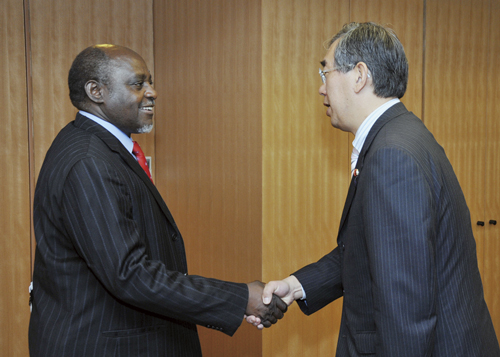
State Secretary for Foreign Affairs Takeaki Matsumoto, right, meeting with Minister of Foreign Affairs and International Cooperation Skelemani of Botswana (October 18, Tokyo, Japan)
7. |
Sub-Saharan Africa |
In recent years, Africa has been realizing relatively high economic growth compared with the industrialized countries while being affected by the economic and financial crisis. Moreover, many conflicts have been concluded, and peace and democracy are unfolding. Amid these developments, the Fédération Internationale de Football Association (FIFA) World Cup was held in South Africa in June and July for the first time on the African continent, giving the international community the impression of a new Africa. On the other hand, conflicts continue in such regions as Sudan and Somalia, while many Africans are still suffering from poverty and infectious diseases.
Under the current circumstances, Africa is becoming increasingly important for Japan’s diplomacy from the perspectives that (1) it is Japan’s duty as a responsible member of the international community to earnestly work toward the resolution of the various problems confronting Africa , (2) it is also important for Japan’s economy to strengthen economic relationship with Africa, a potentially huge market which is endowed with abundant natural resources, and (3) the cooperation of African countries is essential to further address global issues such as UN Security Council Reform and climate change. Japan continued to actively advance its policy on Africa in 2010, focusing mainly on contributions to peace and stability and support for ownership and development.
In working for peace and stability, Japan advanced various cooperation measures for the consolidation of peace in the conflict regions which include Sudan and Somalia. Japan also provided election support and dispatched election observation teams to support the democratization process in such countries as Burundi and Tanzania. In addition, Japan continued to provide support for peacekeeping operations (PKO) training centers in Africa, to increase the peacekeeping capability of African countries.
On the issue of supporting ownership and development, the Second Tokyo International Conference on African Development (TICAD) Ministerial Follow-up Meeting was held in Tanzania in May. Foreign Minister Katsuya Okada, who served as the co-chair of the meeting, reiterated, in his remarks, Japan’s unequivocal determination to implement the pledges made at the Fourth Tokyo International Conference on African Development (TICAD IV), which include doubling Japan’s Official Development Assistance (ODA) to Africa by 2012 and supporting doubling private-sector investments. In addition, Japan is seeking to promote business in Africa as it strengthens public-private partnership through such means as dispatching public and private sector joint missions.
Furthermore, Japan is taking measures to strengthen the foundation of diplomatic relations with Africa, which include establishing a diplomatic mission headed by a charge d’affaires in Djibouti in April to support the activities of the Maritime Self Defense Force.

State Secretary for Foreign Affairs Takeaki Matsumoto, right, meeting with Minister of Foreign Affairs and International Cooperation Skelemani of Botswana (October 18, Tokyo, Japan) |